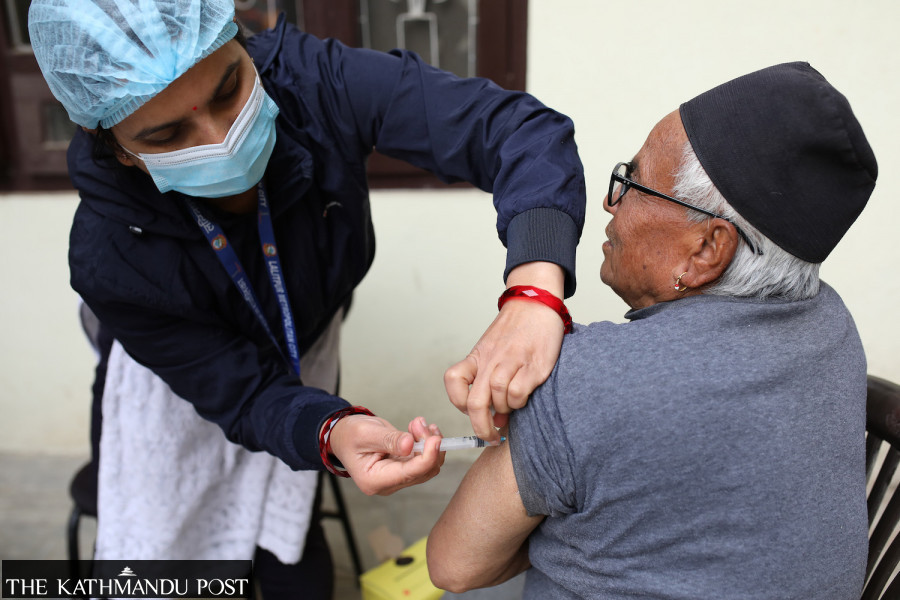Health
Over-60s jabbed with Vero Cell and those immunocompromised to get third dose
Officials say the third dose is part of a series of primary doses for the elderly and people with suppressed immunity.
Arjun Poudel
A third dose of the Covid-19 vaccine will be administered to the people with compromised immunity, and those above 60 years old who have been administered the Vero Cell vaccine.
Though no formal decision has been taken regarding the additional doses by the Ministry of Health and Population, the National Vaccine Advisory Committee has recommended administering a third dose.
“Only formality has remained to start additional doses of vaccine to certain groups,” Dr Bibek Kumar Lal, director at the Family Welfare Division, under the Department of Health Services, told the Post. ‘The additional doses are not booster shots and certain groups with compromised immunity need an additional dose, which is part of a series of the primary doses. Healthy adult people need two doses and those having suppressed immunity need an additional dose.”
The recommendation by the National Vaccine Advisory Committee is also in line with the recommendation of the World Health organisation, which has recommended administering an additional one dose to those with compromised immunity—cancer patients, those who underwent organ transplantation, people living with HIV and those on immunosuppressants.
“The third dose is part of a primary dose required for the people of the said group,” Dr Shyam Raj Upreti, coordinator of Covid-19 Vaccine Advisory Committee, told the Post. “Compared to healthy adults, two doses of Covid-19 vaccine develop less immunity in certain groups, so they require an additional dose.”
The Health Ministry said that all people with compromised immunity who have taken any of the Covid-19 vaccines–Pfizer-BioNTech, AstraZeneca, Vero Cell, or Janssen–will be administered a third dose.
In the case of the Vero Cell vaccine all people above 60 years will be administered a third dose of the vaccine.
Officials said that the Ministry has not yet decided about a booster shot and neither has the World Health Organisation recommended one.
“People are getting confused about booster shots and extended doses,'' said Upreti. “A third dose for certain groups is not a booster shot. No decision has been taken about offering booster shots so far.”
“The UN health body has recommended administering an extended dose after two to six months of the completion of the second dose,” said Lal, director at the Family Welfare Division.
The WHO said that an additional dose may be needed as part of extended primary series for the target population where immune response rate following the standard primary series is deemed insufficient. The objective of an additional dose in the primary series is to optimize or enhance the immune response to establish a sufficient level of effectiveness against disease.
“In particular, immunocompromised individuals often fail to mount a protective immune response after standard primary series [two doses], but also older adults may respond poorly to standard primary series,” reads the WHO’s interim statement.
Public health experts in Nepal have been urging the authorities concerned to start providing booster shots to frontline workers and immunocompromised people.
“Studies have shown that the immunity level wanes after six months of vaccination,” said Dr Prabhat Adhikari, an infectious disease and critical care expert. “Booster shots are not necessary for frontline workers including health workers for their safety but also to prepare the human resources for a possible surge in new cases and to prevent the infection from spreading from frontline workers, who came in contact with many people.”
The new variant of SARS-CoV-2 named Omicron has been detected in at least 57 countries by Thursday.
The World Health Organisation designated Omicron as a ‘variant of concern’ on November 28.
Two cases of Omicron in foreign nationals have been detected in Nepal also but both the patients later tested negative and are doing well, according to the Health Ministry.
Much is not known about the new variant, but experts say the vaccination pace should be sped up even if new variants do not spread in the country.
“We should not forget that several hundreds of people get infected everyday throughout the country and some die, that means deadly virus is still circulating in communities,” Dr Ravi Shakya, director at the Patan Hospital. “We should encourage the people to get vaccinated at the earliest.”
Around 40 coronavirus infected people, whose health condition is serious, have been receiving treatment at the hospital.
According to Shakya, some of the infected patients were fully vaccinated.
So far, 9,058,582 people (29.8 percent of the total population) have been fully vaccinated.
Nepal so far has received 27,147,440 doses of Covid-19 vaccines—Vero Cell, AstraZeneca, Janssen, Pfizer-BioNTech and Moderna.
Nepal launched its Covid-19 vaccination campaign on January 27 this year with 1 million doses of Covishield gifted by India.
Nepal needs to vaccinate around 78 percent of its over 30 million estimated population, or around 25 million people, as per the government’s new plan that includes those aged between 12 and 18 years. Earlier, the government had planned to vaccinate only those aged 15 years and above.
Nepal on Thursday received 1,497,600 doses of Moderna vaccine from the COVAX facility.
It is the second consignment and part of the 3,712,000 doses of Moderna vaccine committed by the facility, the international vaccine sharing scheme backed by the United Nations.
On December 4, the facility supplied 188,400 of Moderna doses.
“We have received 1,497,600 doses of the Moderna vaccine from the COVAX facility today (Thursday),” Badebabu Thapa, a senior officer at the Logistic Management Section under the Department of Health Services, told the Post. “A third consignment of the vaccine is scheduled to arrive on Sunday.”
The facility will deliver 1,965,600 doses in the third consignment.




 11.43°C Kathmandu
11.43°C Kathmandu















